Nigeria’s adolescent girls hold the key to the well-being of their families, neighborhoods and the nation. If given quality basic education and skills; critical knowledge and the capacity to protect their health; and the confidence and opportunity to grow and prosper, their contributions will be multiplied many fold. Unfortunately, many adolescent girls in Nigeria still live in conditions of abject poverty, suffer from multiple socio-economic deprivations, and thus remain exposed to risky sexual behaviour as a means of survival.
Following an action-oriented research conducted by Action Health Incorporated (AHI) to understand the realities, needs and concerns of adolescent girls in Lagos, a multi-dimensional empowerment project was launched in Iwaya, one of the numerous communities designated as blighted or slum areas by the Lagos State Urban Renewal Authority. In partnership with community members and relevant state government agencies including the Lagos State Agency for Mass Education, 108 out-of-school girls were identified to benefit from the pilot phase of this initiative, which has provided adolescent girls in Iwaya with the opportunity to enroll in various programme options that included formal education, non-formal education and vocational skills acquisition through apprenticeship with accredited artisans in the community. As told by themselves, these are the stories of some of the adolescent girls in Iwaya who participated in the empowerment initiative, and are now taking bold steps to improve their lives while contributing to the well-being of their families and neighborhoods.
“I had always dreamed about running my own hairdressing salon”
D amilola Kucheopon is 22 years old stylist and an indigene of Badagry, Lagos State. She attend- ed Jibowu Junior High School and was attending Mainland Senior High School when she became pregnant at 19 and had to drop out of school. Damilo la blames her misfortune on the norms and practices prevalent within her community, Iwaya. She explained that it was considered normal for young girls to have their boyfriends, even if they were much older, provid- ing for their needs and those of their families. “It is seen as a sign of maturity” she said. The girls are also expected to reciprocate these gifts by granting the boyfriends sexual favours, which often results in unwanted pregnancies like it happened to her. Although Damilola’s baby died subsequently, she said she did not go back to school because she didn’t think she could deal with the shame and humiliation she knew would be awaiting her among the school administration and her classmates.
From then on, she began selling water as a way of contributing to her family’s income. Fortunately, she was selected when the AHI team came to identify girls for the empowerment programme. Damilola said, “Some community members said all kinds of things about how they did not trust the scheme and even tried to discourage me and other girls who were selected from participating. They did not believe that anybody would be interested in helping drop- out girls like us.” Many of the girls remained adamant and some even had to plead with their parents and guardians before they could gain their support to join the scheme. Damilola and some other girls from her neighborhood joined the programme to be trained as hair-stylists. “I had always dreamt about running my own hairdressing salon” she said. “This is two years after, I have learnt how to retouch, wash and set hair, as well as do Ghana-weaving, pedicure, manicure and lots more. The same community members are now saying they are happy for us; many of them even came for our graduation ceremony. I have a lot of plans for myself- I hope to have my own big shop and lots of apprentices in this coming year,” she said. In addition, Damilola, acknowledged that she now understands the risk of having multiple partners and has learnt the importance of using protection and keeping herself safe from sexual abuse.
“I know education is important and my children must have it”
B ose Kujannayin is 20 years old. The third child in a family of five children, although she had been enrolled in the past, she was stopped from attending school in Primary 2 and started hawking fish to support her family. “I have always wanted to learn how to sew, so I was so happy when the empow- erment opportunity came to my community,” said Bose. She lamented over the efforts of her extended family members who had tried everything possible to convince her parents to give her and her sisters out for marriage, but her father refused. According to her, although he was unable to afford keeping them in school, he always wanted them to learn one trade or the other and grow up to be successful women. “He gave me every support to join the empowerment scheme when they were registering girls in my area.”
Bose recalls, “When we were being taught about Sexually Transmitted Infections and HIV during one of the evening classes, I thanked God silently because I have never been the type that go around with different men. She enthused about how useful the opportunity had been for her, saying “The training they gave us has helped me set good goals for myself, and I now know what I want from my life. I know I don’t want to rush into marriage and if marriage eventually comes, I want to have a proper court marriage. I have also learned to control my anger and stay out of trouble.”
Bose shared how so many people in her community didn’t initially believe in the programme, so they were all surprised when she and her colleagues graduated. Today, many of the community members are awaiting a similar programme to come their way again. Bose, who speaks proudly about how well she now sews, and how she has cultivated the habit of saving, says she wants to have 3 children in the future and she will make sure they all get formal education. “I know education is important and my children must have it” she said.
“I am proud to say that I am a tailor.”
S andra Togbe, 15 years old and the ninth of her family’s ten children had never been to school. Her father has other wives and her mother is a fish seller. When asked why she had never been enrolled in school, Sandra said, “My parents can’t afford to send me to school and like me, many young people in this community would also like to learn a trade. Unfortunately, many parents prefer that we go and hawk for the family. They are satisfied with the little money their children can bring back after selling every day”.
She recounted her experiences before her selection for the girls’ empowerment scheme. “When hawking fish for my mother, I would walk very far just to get 200 Naira”. She narrated how men would offer to pay more money for her wares, in exchange for sex. “They will ask me to come into their house, saying that they would give me 1,000 Naira for my fish, but I would refuse,” she said. “I know that I am too young and if I dare get pregnant, I can die during labour. All I wanted was to just learn a trade, not get pregnant.”
“Now I am proud to say that I am a tailor. I like my life and my body feels better. I do not have constant headaches like I used to, when I used to hawk. I am always busy at work, so those of my friends who used to come by my house so that we could go and visit boys together no longer find me at home. Some people tried to discourage my mother from allowing me to learn this trade, but she didn’t listen to them. Now I make my own money and support our family better. I even sew for my other brothers and sisters. I am also learning to read and write from the evening classes I attend three times a week after we close from work at my training place”.
“Poverty made my sister run away from home.”
D amilola Ayivoji is from a family of 12 children and her father has four wives. Damilola narrated how much happier she has become since she enrolled at Premier Foundation Primary School. According to her, she had always wished she could attend school like some of her peers but never had the opportunity, because her parents couldn’t afford it. She said that the level of poverty in her family was so unbearable that one of her sisters once ran away from home to another man’s house. With a very bright smile, Damilola spoke about how her life has changed since she started attending school, “I am always so busy studying, especially solving mathematics problems, and everyone around my area complements me about my good behavior. I am so grateful for this opportunity that is helping my family. They enrolled my younger sister and I in school.” Damilola, whose best subject is basic science, says that once she completes primary school she would like to go on to Jibowu High School and then attend the University of Lagos which is a short walking distance from Iwaya community. She aspires to get a degree in medicine and eventually build a hospital in her community and help save lives.
“When I got my report card for our last exam, and I saw that I came third overall, I ran to my mother’s shop to tell her. She was so happy and she bought popcorn for me to celebrate my passing well in school.” Damilola condemns the exclusion of girls from education and says, “Everyone should be allowed to go to school, so long as the person is willing to study.” She burst into tears as she recalled how one of her friends who was forced to get married died during childbirth, and said she wished that parents would just stop giving out their children when they are still so young.
“I and my parents have agreed that I will complete school before marriage”
D eborah Achou is 14 years old and in primary school. Before she was identified for enrollment in the out-of-school girls’ empowerment programme, Deborah’s daily routine centered on assisting her mother with her petty trade and hawking fish around her neighborhood in Iwaya to support her family. She said, “I started selling fish from when I was very young. It is part of what I have to do to help my parents. I believe that it is what you do to your parents that your children will also do to you.” She is one of the more fortunate young girls in her community whose parents haven’t given out, in marriage to an older man with enough money to contribute towards the family’s expenses.
Although she is now enrolled in school, she still does the house chores assigned to her before she sets out every day. “I just have to make sure I wake up very early to do my work, and help my mother before I go to school.” According to her, she cannot use going to school as an excuse not to help her parents with share of the housework.
“This empowerment programme came just to protect girls like me – who want to go to school but our parents don’t have the money. It is saving us from the hands of wicked men. They will not send us to school, but they want us to come and sit in their house and have children for them” she said. “Now I can read and write, and when I attend to customers in my mother’s shop, I can speak English with them, not like before when I will always have to look for someone to help me interpret what the customer is saying anytime I had to sell anything to them. I also help my mother read messages sent to her mobile phone and write letters she wants to send to people in our hometown- this always makes her very happy”
Deborah herself is quite pleased about the turn of events in her family especially because any talk about her getting married is not on their agenda. “I and my parents have agreed that I will complete schooling before marriage. I know that I want to be a lawyer and I am going to do everything I can do to complete my education.”
“Nobody believed that I could change this much…”
B eatrice Gandeh is 18 years old and she shared how she used to be so rebellious and did whatever she wanted to without minding the consequences. Her father, a fisherman and her mother a fish trader, did not even trust that she would be retained on the empowerment programme when she was selected. She attributed the turnaround she experienced to her participation in the sexuality education classes organized by AHI as part of the out-of-school girls’ empowerment scheme. There, she said, was where she learnt how to understand herself and relate better with other family members and neighbours. “I have been registered in the hair-dressing and beautician training and after about six months, my parents started treating me differently because they said I had changed”. So far she has learnt how to do hair-weaving, ‘didi’, hair attachment and extension fixing, pedicure and manicure. “Every day now, when my mother gives me 100 Naira for my meals, I use some of it to buy food and I try to save the rest, so that at the end of the month I have some I can use to buy my sanitary pads, creams and sometimes clothes.”
“Nobody believed that I could change this much and become so respectful. They did not even think I would last up to one month at my place of work before my boss would have to chase me away because of my rudeness, but I have changed. Now, whenever people ask my mother what she did to make me this calm, she tells them “it is those empowerment people ooo!”
Beatrice, says that once she completes her training on the empowerment scheme, she wants to set up her own hairdressing shop and be able to take care of her siblings and parents. She also advises other young girls “… don’t go and fall for those type of friendship where they expect you to pay them with what you have.”
“I know I will become a medical doctor someday.”
S andra Agenge is 16 years old and was born in a village not too far from Badagry. She recalls that her parents relocated to Lagos with herself and her other four siblings when she was eight years old. “I had since waited for the day I would put on a uniform to go to school like some of other girls”. Unfortunately, the dire circumstances of her family’s poverty made it unviable for her to accept the option of schooling provided on the empowerment scheme. Rather, she had to clinch the option of attending vocational training offered to the older girls.
“I am so glad I was able to join the scheme. I have been able take myself from my harsh life situation and I am now doing something better with my time. I didn’t always look this fine — I used to be so untidy. But after I was selected to train as a hairstylist and from attending the personal hygiene classes, I have noticed that I am looking very different… When I look at myself in the mirror, I am happy with who I see.”
“I wake up early every day to help with the housework before getting ready to go to work at the hairdressing salon where I am registered. I really like the place and my boss is very understanding. I work very hard too and never miss the evening classes three times a week after school.”
Sandra, says she hates being idle and is always looking to be involved in ventures that that keep her busy, “… as an idle mind is where the devil will build a very big house.” When asked about her plans for the future, she said, “I have not stopped trusting God for the opportunity to go to school. I still have faith and I’m working hard with my present hairstylist training– but I know I will become a medical doctor someday.”
Lessons from Iwaya are a call for action
A s the girls on the Iwaya programme move towards improvements in their life trajectories, so much remains to be done for girls in similar poorly resourced communities by all stakeholders— government and the private sector. Although the patterns seen in communities such as Iwaya are magnified by the grinding poverty and dense population, they are not unique to slum areas and are of national relevance.
Thus the lessons AHI and our partners are learning from this initiative to support girls in the three primary, interconnected dimensions of their lives—personal, social and economic empowerment—are of relevance not only for Iwaya and other slum communities, but for Nigeria as a whole.

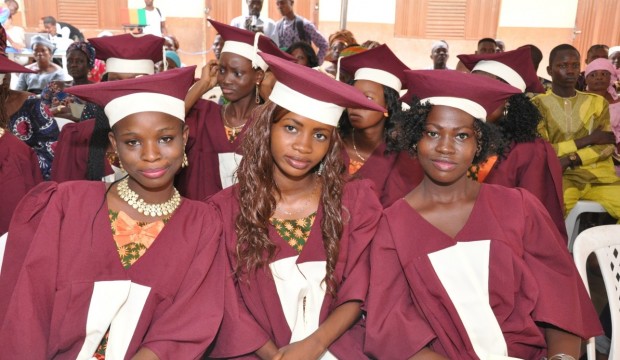
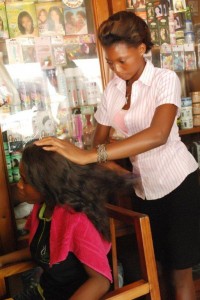
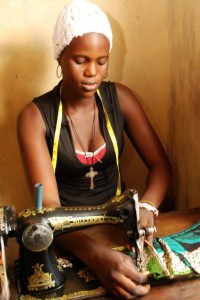
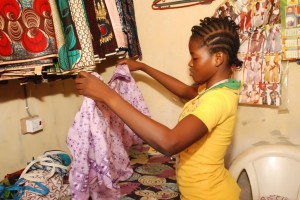
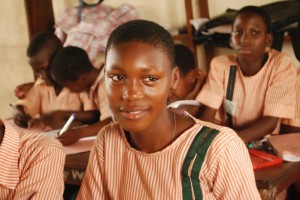
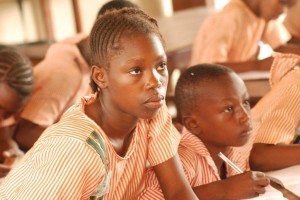
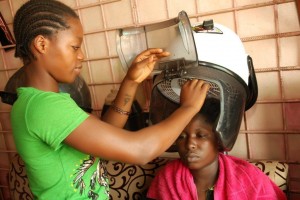
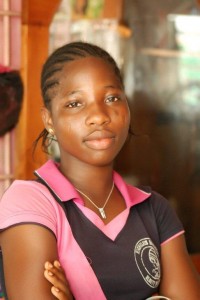
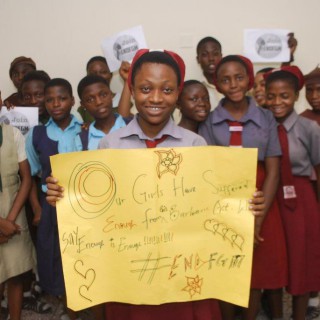

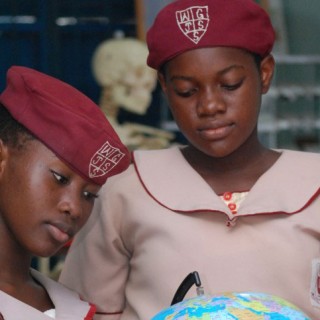
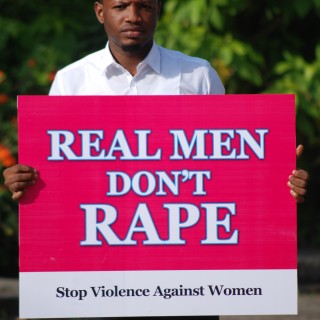
You must be logged in to post a comment.